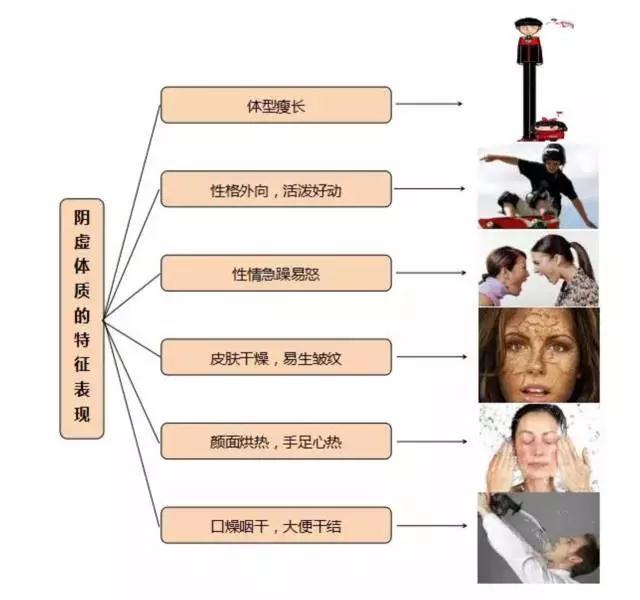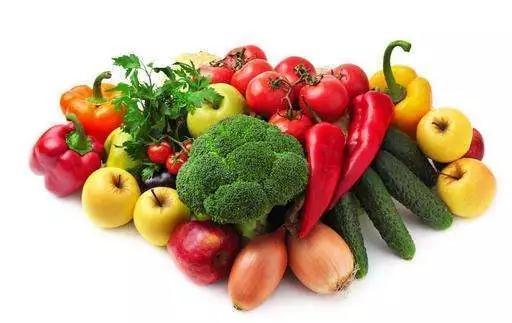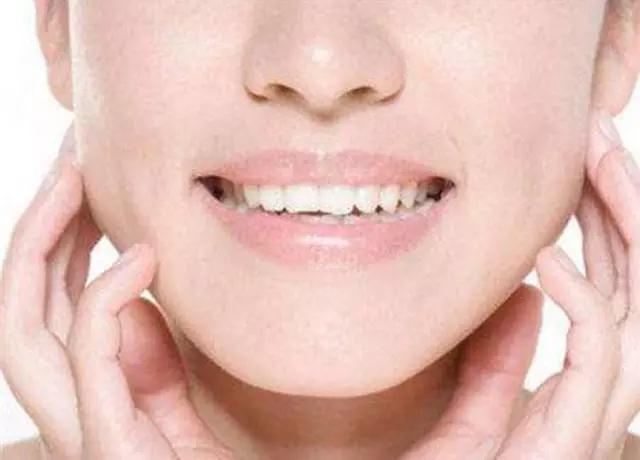This public account is hosted by the Yunnan Provincial Administration of Traditional Chinese Medicine. If you haven’t followed us yet, please click the blue “Yunnan TCM” above to follow.

As the weather cools down, many people begin to experience symptoms of Yin deficiency and excessive Yang, such as dry mouth and throat, irritability, and insomnia. Autumn and winter are the best times to nourish Yin. So how should individuals with Yin deficiency maintain their health during autumn? How can they regulate their condition?

What are the characteristics of individuals with Yin deficiency?

How is Yin deficiency formed?

Recommendations for Nourishment

Nutritional Recommendations
Yang energy is like the sun’s warmth, while Yin energy is akin to the nourishing rain that moistens the earth and promotes growth. When the weather is hot for an extended period and there is insufficient rainfall, riverbeds dry up, and crops wither. This is a state of imbalance caused by insufficient Yin fluids failing to restrain excessive Yang energy. For the human body, a deficiency in Yin fluids leads to dryness of the skin and mucous membranes, resulting in common symptoms such as dry skin, dry mouth and throat, and constipation.
Individuals with Yin deficiency should increase the intake of sweet, cool, and moistening foods, such as celery, spinach, bean sprouts, loofah, cucumber, winter melon, water chestnut, lotus root, white radish, and tomatoes, as well as fresh fruits like pears, bananas, grapes, persimmons, sugarcane, loquats, coconuts, and mulberries.
For meats and seafood, lean pork, pig’s trotters, duck, turtle, soft-shelled turtle, squid, jellyfish, clams, and oysters are recommended. It is also advisable to incorporate herbs like Sha Shen (Glehnia root), Yu Zhu (Polygonatum), Mai Dong (Ophiopogon), and Bai He (Lily bulb) into porridge, soups, or sweet soups. It is important to reduce the intake of warming and drying foods such as lamb, dog meat, chili, Sichuan pepper, leeks, ginger, garlic, durian, and lychee.
Additionally, it is recommended to use steaming, boiling, blanching, or stewing methods for cooking, as these methods help retain the moisture and nutrients of the ingredients. Avoid frying or roasting, as these methods can increase the drying and warming nature of the food.
“Nourish Yang in spring and summer, and nourish Yin in autumn and winter.” Currently, the weather is relatively dry, and consuming moistening and Yin-nourishing foods at this time can take advantage of the seasonal benefits and further support the storage of Yin essence.

Daily Living
Individuals with a constitution of Yin deficiency often have insufficient Yin fluids, leading to relatively excessive Yang energy, which can cause a state of irritability and hyperactivity. During sleep, Yang energy retracts, allowing Yin fluids to nourish the body. It is recommended for those with Yin deficiency to adjust their daily routines to ensure adequate rest and sleep.
The bedroom should be decorated in soft colors, and it is advisable to avoid strong tea or coffee before bed. Avoid playful activities or intense exercise before sleep, and create a quiet environment for rest. A calm mind leads to peaceful sleep. The balance of Yin and Yang in the kidneys is fundamental to the body’s Yin and Yang. Excessive indulgence can harm Yang and deplete Yin. Even for ordinary individuals, moderation in sexual activity is necessary, and those with Yin deficiency should pay extra attention to preserving Yin and essence. Furthermore, tobacco is recorded in the “Bencao Huiyan” as “bitter and pungent, hot in nature, and toxic,” while alcohol is described in the “Bielu” as “bitter, sweet, pungent, very hot, and toxic.” Long-term smoking and drinking can easily generate internal heat; therefore, individuals with Yin deficiency are advised to quit smoking and drinking.

Physical Exercise
High-intensity exercise or prolonged physical activity can lead to excessive sweating and thirst, as movement raises Yang energy and forces fluids outward, resulting in a certain loss of Yin fluids. Individuals with Yin deficiency, who already have insufficient fluids, should choose moderate-intensity, intermittent exercise, such as Tai Chi, Ba Duan Jin (Eight Pieces of Brocade), or fitness routines that combine movement and stillness.
Avoid exercising in direct sunlight or in hot environments, and pay attention to sweating. Replenish fluids promptly after exercise.

Emotional Regulation
Individuals with a constitution of Yin deficiency often have fluctuating emotions and can be easily irritated. It is important to pay attention to emotional regulation, remain calm in the face of challenges, and learn how to cope with both favorable and adverse situations while maintaining a stable mindset. In daily life, listening to soft and soothing music can be beneficial, as well as cultivating hobbies such as calligraphy, painting, or playing musical instruments. For example, practicing calligraphy requires focus and calmness, and long-term practice can cultivate patience, improve mental clarity, and help eliminate distracting thoughts, leading to a tranquil mind. Spending leisure time in beautiful and serene environments can also enhance mood and promote relaxation.
135 Editor
White Fungus, Lotus Seed, and Lily Bulb
Ingredients:One large piece of white fungus, 40g lotus seeds, one fresh lily bulb, 10 red dates, 10g goji berries, and an appropriate amount of rock sugar.
Method:Wash the white fungus, remove the yellow part at the base, tear it into small pieces, and soak it in cold water overnight or in warm water for several hours until it becomes soft. Remove the core from the lotus seeds and soak them in warm water for 1 hour. Clean the fresh lily bulb and set it aside. Add an appropriate amount of water to a pot, combine all ingredients except the fresh lily bulb, bring to a boil over high heat, then reduce to low heat and simmer for about 1 hour. Add the fresh lily bulb and rock sugar, and cook for another 10 minutes until the sugar dissolves, then serve.
Effects:Nourishes Yin and blood, calms the heart and mind.
Honey Lemon Rose Drink
Ingredients:Two fresh lemons, an appropriate amount of honey, and 5 dried rose flowers.
Method:First, prepare the honey lemon: Wash the fresh lemons several times with salt, slice them thinly, and prepare a clean glass jar of suitable size. Layer a few lemon slices at the bottom, then pour in a layer of honey, followed by more lemon slices, and continue layering until full. Seal the jar and gently shake it to mix the honey and lemon evenly, then refrigerate for 5-7 days. When ready to consume, place the rose flowers in a cup, take 2-3 slices of lemon, add a spoonful of honey lemon juice, and pour in 200ml of boiling water. Steep for 10 minutes before enjoying.
Effects:Nourishes Yin, moistens dryness, generates fluids, and relieves thirst, soothes the liver, and alleviates depression.
Sha Shen, Yu Zhu, Lotus Root, and Old Duck Soup
Ingredients:Half an old duck, 30g Sha Shen, 30g Yu Zhu, 500g lotus root, and 3 slices of ginger.
Method:Clean the slaughtered old duck, remove feathers and internal organs, and cut it into pieces. Peel and cut the lotus root into chunks. In a pot, add cold water, bring to a boil, and blanch the duck pieces to remove blood impurities. In a soup pot, add an appropriate amount of water and all ingredients, bring to a boil, then simmer on low heat for 2 hours before adding salt to taste.
Tooth Tapping and Saliva Swallowing Method

Method:Sit quietly, calm your mind, and regulate your breathing. Lightly close your lips and rhythmically tap your upper and lower teeth together, starting with the molars, then the incisors, and finally the canines, tapping each for 36 times. After tapping, use your tongue to stir against the upper and lower gums and teeth, moving clockwise 18 times and counterclockwise 18 times. Ancient health practitioners referred to this as “Red Dragon Churning the Sea.” Then, press the tongue against the roof of the mouth to gather saliva. When there is a significant amount of saliva, swish it in your mouth several times, and finally swallow it slowly in three portions. During swallowing, focus on the lower dantian, as if the saliva is sinking into it. The above steps constitute a complete practice, and it is recommended to perform this method once before bed and once in the morning, with more repetitions being better.
Effects:Traditional Chinese medicine believes that “saliva is the fluid of the kidneys.” Historically, saliva has been referred to as sweet liquid, jade spring, and other names. As noted in “Honglu Diansnow”: “Once the saliva is swallowed, it transforms into blood in the heart, clarifies vision in the liver, nourishes the spirit in the spleen, aids qi in the lungs, and generates essence in the kidneys. Naturally, all parts of the body are harmonized, and diseases do not arise.” Therefore, swallowing one’s own saliva helps to store Yin essence and nourish the body.
Copyright Statement:This article is sourced from the Guangdong Provincial Hospital of Traditional Chinese Medicine, recommended for publication by Yunnan TCM, with copyright belonging to the original author.
Editor/Chen Sisi Layout/Wei Jiao
Reply with the following keywords in the WeChat dialog box to view the corresponding articles
Anti-aging | Weight Loss | Heat | Obesity | Headache | Blood Nourishment | Menstrual Irregularities | Pediatric Diarrhea | Pediatric Tuina | Kidney Deficiency | Cold Uterus | Breast Hyperplasia | Anti-cancer | Impotence | Premature Ejaculation | Prostate | Bad Breath | Skin Whitening | Breast Enhancement | Hair Loss | White Hair | Freckle Removal | Diabetes | Acne | Postpartum Care | Dermatitis | Rheumatism | Coronary Heart Disease | Meridians | Hypertension | Hyperlipidemia | Dysmenorrhea | Hemorrhoids | Constipation | Insomnia | Spleen and Stomach | Hangover Relief | Cold | Liver Nourishment | Cold Hands and Feet | Rhinitis | Cervical Spondylosis | Kidney Tonification | Oral Ulcers | Snoring | Toothache | Throat Inflammation | Lumbar Disc Herniation | Cough | Eye Care | San Qi

Click “Read the original text” to enter “Qihuang Academy” and start your remote TCM learning journey!

